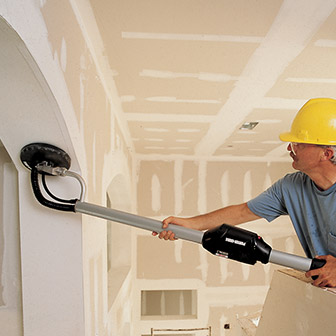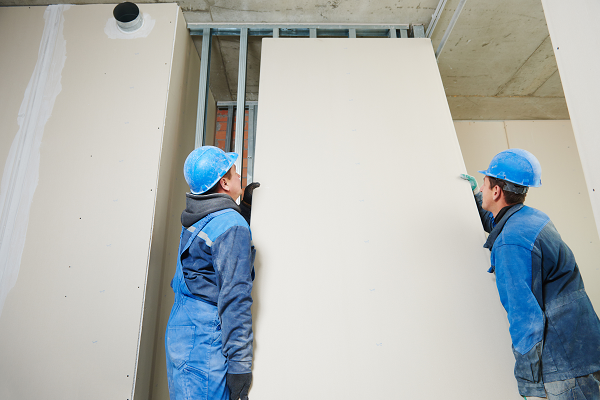
If you're looking for a drywall sander that can do more than just sand drywall, then look no further than the Makita XLS01T. This cordless unit comes with a direct drive brushless motor. It can operate for 35 mins using 120 grit. You will find a telescoping shaft with variable speed dial and an articulating head to make it easier to tackle a variety of drywall tasks. The optional AWS transmitter module can be purchased to provide additional sanding options.
The Festool Planex Sander is a clear winner. However, there may be other products that you are interested in. For example, the Festool Planex has been an industry leader in the sanding category for years. Although it's not the most beautiful sander available, its unique design provides many advantages over the rest.

The sander mentioned has a 12 foot hose, which is great if you work in large rooms. The shaft can be extended to 16-1/2 ins, giving you more reach that most other units. It also features an articulating sander head and flexible joints that make sanding nearly dust-free.
The aforementioned sander is also AWS-ready, meaning that it can be paired with a Makita dust extractor for maximum productivity. The sander is rated at 40 minutes of operation and can be purchased through Amazon for $509. It also features a brushless motor that allows it up to four times the power of its predecessor. Another cool feature of the sander is the random orbit movement, which helps you keep the sanding smooth.
AirLock connects the sander to a compatible dust extractor, allowing it to be used quickly and securely. Telescoping shafts allow the sander to fit into tight spaces. The variable speed dial makes it easy to adjust power for any sanding job.
The sander comes with the smallest sanding tools, which are not too small. This sander can sand 312 square inches. It is suitable for a variety of projects. Makita also manufactures the XLS01T drywall sander, XCV08Z vac, as well as the XLS01T sander Extension, which provides 22-3/4 in more reach.

The Makita XCV08Z is another vac, a Makita vacuum that uses AWS technology. This can be used wirelessly to activate a Makita vacuum compatible with it.
FAQ
Should you do floors or walls first?
It's important to know what you want to accomplish before you start any project. It is important that you think about how and who you want to use the space. This will help you choose flooring or wallcoverings.
You might choose to first install flooring if your goal is to create an open concept kitchen/living area. You could also consider wall coverings for privacy if this is the space you are looking to create.
How long does it usually take to renovate your home?
It all depends on the project's size and how many hours you spend each week. The average homeowner spends between three to six hours per week on the project.
Should I hire an architect or builder?
If you are planning to renovate your own home, it may be easier to just hire someone else to do the work for you. However, if you are planning to buy a new home, then hiring an architect or builder will help you make sure that you get exactly what you want.
Statistics
- ‘The potential added value of a loft conversion, which could create an extra bedroom and ensuite, could be as much as 20 per cent and 15 per cent for a garage conversion.' (realhomes.com)
- The average fixed rate for a home-equity loan was recently 5.27%, and the average variable rate for a HELOC was 5.49%, according to Bankrate.com. (kiplinger.com)
- They'll usually lend up to 90% of your home's "as-completed" value, but no more than $424,100 in most locales or $636,150 in high-cost areas. (kiplinger.com)
- It is advisable, however, to have a contingency of 10–20 per cent to allow for the unexpected expenses that can arise when renovating older homes. (realhomes.com)
- Rather, allot 10% to 15% for a contingency fund to pay for unexpected construction issues. (kiplinger.com)
External Links
How To
5 Things You MUST Know Before Starting Your Home Renovation
-
This is a big undertaking. It's likely that you will need assistance if you plan to tackle a large home improvement project, such as remodeling your kitchen or bathroom or building a new home. You might reconsider if you're not confident enough to handle such a huge task on your own. It could take up a lot of your time and money, and you won't get any real benefits from it. Instead, you can hire someone who knows their stuff to help. You'll be able to save a lot of time and stress while still having a lovely space to call your own.
-
How much should I spend? This is a common question, but it can make renovations more expensive. You'll likely have to repay most of your costs at the end. You should stick to your budget, even if it's a tight one. Otherwise, you could end up paying a fortune without getting anything in return.
-
Do I hire professionals or do I need to DIY? - There's no right or wrong answer here, but we'd recommend hiring professional tradespeople if you can afford them. Their advice will be invaluable in helping you decide how to proceed. They will be able to install the plumbing properly, make sure everything is safe, and give you a warranty after they are done. DIY projects often involve a lot trial and error. You'll learn a lot the hard way. Plus, you'll have to deal with all sorts of problems that arise during the process.
-
Can I afford it? - Do not underestimate how expensive a renovation project will cost. Even if your budget is tight, you may need to borrow money to cover costs. You should also consider the cost of selling your property if you plan to move soon after the renovations are completed.
-
How do I begin? There's no right or incorrect place when it comes down to where to start. We suggest you choose something you like to do. This will help you stay motivated and make it less likely that you procrastinate. You should also avoid areas that require extensive maintenance. You should avoid redecorating your living room if it is always covered in dirt and dust.